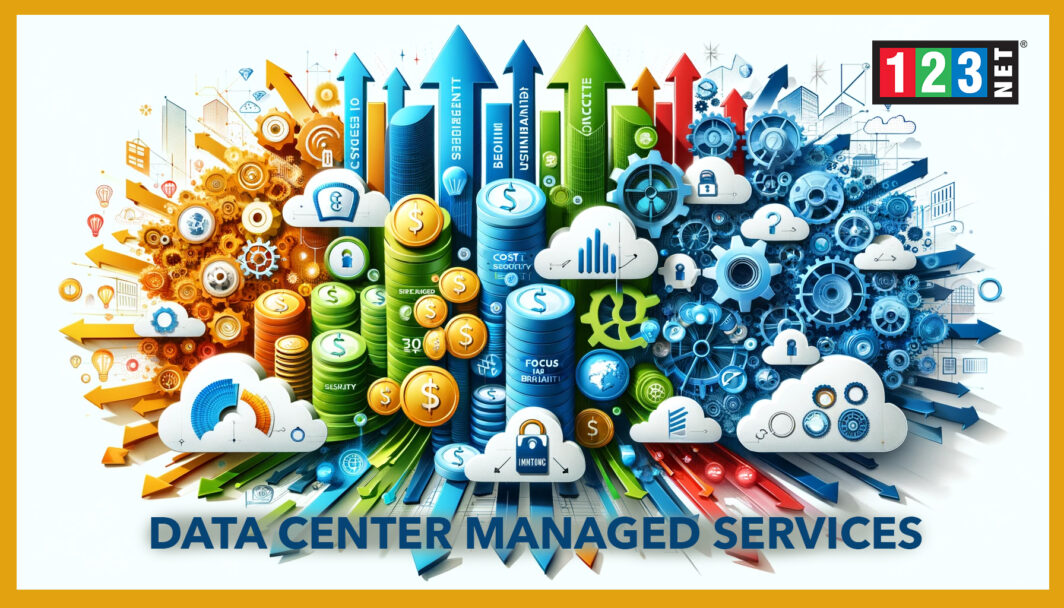
Introduction
Data center managed services involve delegating the day-to-day IT management responsibilities of data center infrastructure to specialized third-party providers. This approach allows companies to concentrate on their primary business activities. Benefiting from the expertise and support of external professionals in handling their data center operations. Such services encompass a broad range of tasks, including the management of networks, data storage solutions, and security protocols. As businesses continue to evolve and the demand for scalable, reliable, and technologically advanced IT solutions increases, the relevance of managed services has become more pronounced. They offer a strategic advantage by providing access to the latest technology and operational expertise without requiring significant capital expenditure. This not only enhances operational efficiency but also ensures that businesses can adapt to changing market demands while maintaining a focus on innovation and growth.
The Evolution of Data Center Managed Services
The notion of managed services has significantly transformed, expanding from mere hosting solutions to the all-encompassing management of a corporation’s entire IT infrastructure. In the early stages, companies primarily sought external assistance to oversee physical servers and rudimentary network infrastructures. However, as technology has advanced and IT environments have become increasingly complex, the scope of managed services has broadened dramatically. Presently, these services cover an extensive range of IT functions that include, but are not limited to, cloud services, virtualization, automated IT solutions, cybersecurity, data analytics, and support for remote work technologies. This evolution mirrors the escalating intricacy and diversity of IT systems and the growing necessity for specialized knowledge and skills in their management.
The shift towards comprehensive managed services is driven by businesses’ desire to leverage the latest technological advancements while minimizing the burden of managing complex IT systems in-house. By outsourcing IT management to experts, companies can focus on their core objectives. Ensuring operational efficiency, cost-effectiveness, and the ability to quickly adapt to new technological trends and market demands. This strategic approach not only facilitates access to cutting-edge technologies and methodologies but also enhances a company’s ability to innovate in an ever-changing digital landscape.
Key Benefits of Data Center Managed Services
Cost Efficiency and Reduction in Operational Expenses
Data center managed services present a compelling proposition for businesses seeking to enhance operational efficiency while curtailing expenses. A standout benefit is the considerable cost savings they facilitate. Businesses can sidestep the substantial capital outlays required for establishing and operating their own data center facilities. Instead, they tap into the economies of scale and operational efficiencies that managed service providers (MSPs) offer. These providers leverage their expansive infrastructure and expertise to deliver cost-effective solutions for individual companies to replicate independently.
Enhanced Security and Compliance
Moreover, enhanced security and compliance are pivotal advantages of partnering with MSPs. In an era where cyber threats loom large and regulatory requirements are increasingly stringent, MSPs dedicate substantial resources to ensure data centers meet the highest security standards. Through the deployment of advanced security technologies, MSPs safeguard sensitive data against emerging threats and vulnerabilities.
Scalability and Flexibility
Scalability and flexibility are also inherent in data center managed services. This is providing businesses with IT solutions that can dynamically scale and adjust to their evolving needs. This adaptability is crucial for supporting growth and expansion efforts without necessitating significant initial investments in IT infrastructure. As business demands fluctuate, managed services can seamlessly scale up or down, offering a tailored approach.
Focus on Core Business Functions
Additionally, outsourcing data center management allows businesses to redirect their focus towards core activities and strategic initiatives. This shift not only bolsters operational efficiency but also fosters innovation and strategic planning. Companies are thus emancipated from the intricate and time-consuming tasks associated with IT management, empowering to enhancing their core offerings. This also helps with exploring new market opportunities, and achieving competitive advantages.

Understanding Managed Services: Core Components
Network Services
In the realm of data center operations, the essence of network services cannot be overstated. Managed Service Providers (MSPs) play a pivotal role in delivering comprehensive network services that are fundamental to maintaining high availability, performance, and security of data centers. By leveraging their expertise, MSPs ensure that network infrastructure is optimized to support seamless communication and data transfer processes, essential for the uninterrupted operation of business activities.
Security Services
Security services stand at the forefront of MSP offerings, addressing the critical need for stringent security compliance. In an era where cyber threats are increasingly sophisticated, MSPs equip businesses with robust security frameworks designed to safeguard data and infrastructure. These frameworks encompass a variety of defensive mechanisms, including advanced threat detection, encryption, and access control, thereby fortifying the digital assets against potential cyber-attacks and vulnerabilities.
Storage and Backup
Furthermore, storage and backup solutions form a cornerstone of MSP services, emphasizing the importance of data integrity and availability. Managed storage and backup services offer comprehensive disaster recovery solutions, meticulously designed to minimize downtime and prevent data loss. These solutions are pivotal in ensuring that businesses can rapidly recover from disruptions, maintaining operational continuity and safeguarding critical data.
Disaster Recovery Planning
Disaster recovery planning is another critical service offered by MSPs, underlining their commitment to ensuring business continuity. MSPs meticulously develop and implement disaster recovery plans tailored to the unique needs of each business. These plans are instrumental in preparing businesses to effectively respond to and recover from unforeseen disruptions, thereby minimizing operational impact and ensuring resilience.
Monitoring and Management
Lastly, the continuous monitoring and management of IT infrastructure underscore the proactive approach MSPs take towards maintaining operational efficiency. Through constant vigilance, MSPs are able to identify and resolve issues swiftly, preventing potential disruptions and optimizing the performance of IT systems. This ongoing oversight ensures that the IT infrastructure is always aligned with the business’s operational requirements, enabling seamless and efficient business processes.
Choosing the Right Data Center Managed Services Provider
Choosing the appropriate Managed Service Provider (MSP) is a critical decision that demands meticulous evaluation of various factors to ensure alignment with your business’s needs and expectations. Key considerations include the MSP’s area of expertise, to confirm they have the necessary experience and knowledge in managing IT infrastructures similar to yours. Scalability is another crucial factor; the MSP must be capable of adjusting their services to accommodate your business’s growth and evolving needs. This ensures that as your company expands, your IT infrastructure can seamlessly scale to support increased demands.
Security measures employed by the MSP are of paramount importance, given the ever-present threat of cyber attacks. It’s essential to assess their security protocols and defenses to ensure your data and infrastructure are protected against potential threats. Support services are also vital; understanding the level of support offered, including response times and availability.
Furthermore, a thorough evaluation of the Service Level Agreement (SLA) provided by the MSP is indispensable. The SLA outlines the specific services offered, performance metrics, and guarantees made by the provider. It serves as a foundational document that sets expectations for service delivery, availability, and response times. Also ensuring accountability and providing a clear framework for the partnership. By carefully considering these aspects, businesses can select an MSP that best fits their operational requirements and strategic objectives. Helps with fostering a successful and mutually beneficial relationship.
The Role of AI and Automation in Managed Services
Artificial Intelligence (AI) and automation have become integral to boosting the efficiency and reliability of data center managed services. These technologies empower Managed Service Providers (MSPs) with predictive analytics capabilities. Enabling them to foresee potential issues before they escalate into critical problems. By analyzing data patterns and trends, AI systems can predict equipment failures, security breaches, and other potential disruptions. This is allowing for preemptive action to mitigate risks. This foresight significantly reduces the likelihood of downtime, ensuring that businesses experience uninterrupted service and optimal performance.
Moreover, AI and automation facilitate the automation of routine tasks, from system updates to security checks. Also streamlining operations and freeing up valuable resources. This not only improves operational efficiency but also allows MSPs to allocate their expertise to more strategic areas. Such as innovation and customization of services to meet specific client needs. The automation of mundane tasks ensures a higher level of accuracy and consistency in service delivery. This helps with minimizing human error and enhancing the overall quality of services provided.
The adoption of AI and automation by MSPs marks a transformative shift in how data center services are managed. This is offering a proactive and efficient approach to maintenance and service delivery. Also technological advancement ensures that businesses can rely on high-performing, resilient IT infrastructures that support their ongoing growth and adaptability.

FAQs: Data Center Managed Services
- What Are Data Center Managed Services? A: They are IT management services provided by third parties for data center operations, including network management, security, and storage.
- How Can Managed Services Reduce Costs? A: They reduce the need for capital investment in IT infrastructure and personnel, offering cost-effective access to advanced technology and expertise.
- What Should I Look for in a Managed Services Provider? A: Key factors include expertise in IT infrastructure, scalability, robust security measures, and comprehensive support services.
Data center managed services represent a strategic approach to managing IT infrastructure, offering businesses the benefits of cost efficiency, enhanced security, scalability, and the ability to focus on core operations. As technology continues to advance, the role of managed services will undoubtedly grow, further emphasizing their importance in the digital age.




